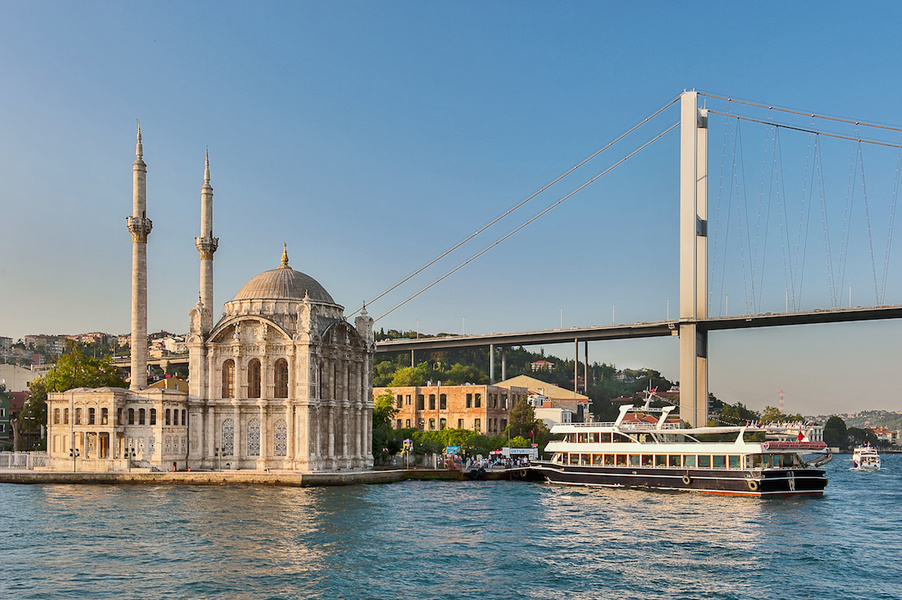« Istanbul’s Bosporus Strait, one of the world’s busiest waterways, is threatened by naval mines drifting across the Black Sea from Ukraine, posing a danger to maritime traffic in the area » says Andrew Wilks in Al-Monitor.
Three mines have been destroyed over the past two weeks, the third detonated by Turkish military divers near the strait’s northern entrance on Wednesday, raising concerns about the growing risk to the thousands of tankers and container ships that pass through the channel every year.
Ukraine and Russia have accused each other of laying mines. They share the Black Sea coastline with Turkey, Bulgaria, Georgia and Romania.
Ukraine’s Foreign Ministry has accused Russia of setting adrift Ukrainian mines it seized after the 2014 annexation of Crimea to “discredit Ukraine before international partners.” The ministry’s statement said Russian Gen. Mikhail Mizintsev warned on Tuesday of the “threat of Ukrainian mines drifting along the coastline of Black Sea states.”
The appearance of mines led to the temporary closure of the Bosporus, which links the Marmara and the Mediterranean seas to the Black Sea, and a ban on nighttime fishing in the area. The Turkish navy has stepped up its air and sea operations to find them.
Military commentators have suggested the mines broke free of their cables during bad weather and have been carried by currents across the Black Sea. According to Russian authorities, some 420 mines were at one time anchored off the Ukrainian coast.
“How many mines have been laid; how many stray mines have broken free?” Ozgur Tor, a retired Turkish brigadier general, said in an interview with Ihlas Haber Ajansi. “All the others that remain must be found. If not, it poses a danger to any [ship] in the Black Sea. We’re talking about 30 kilos of explosives, the power to sink a ship. It needs to be cleaned up until the last mine is gone.”
The first mine was spotted by fishermen off the coast of Sariyer, an Istanbul suburb on the European coast of the Bosporus, on March 26.
Turkey had previously advised ships to keep a “sharp lookout” and report any possible mines.
“What’s in Ukraine is coming here. After 20 to 25 days, those mines can spread from Igneada to Sinop,” said Atif Malkoc, chairman of the Samsun Fisheries Cooperatives Association, referring to towns that span Turkey’s coast from the Bulgarian border eastward. “It’s very dangerous for fishermen and ships. There’s nothing we can do [but] everyone will look out for them.”
Last year some 38,500 ships, including crude oil tankers, passed through the Bosporus, which Turkey closed to military vessels shortly after Russia’s Feb. 24 invasion.
The risk of shipping accidents on the 30-kilometer (19-mile) channel is cited as a justification for the Turkish government’s plan to build a canal to circumvent the winding waterway, which runs through the heart of Istanbul, Turkey’s largest city with 16 million residents.
The risk posed by stray mines is not the first threat to neighboring countries since the war began.
A Soviet-made aerial drone armed with explosives crashed near a student dormitory in the Croatian capital Zagreb on March 10, having crossed over three NATO-member states. A large explosion damaged parked cars but no-one was injured.
Shipping trapped in Ukrainian ports at the start of the war have also faced danger. An Estonian-owned cargo ship was sunk off Odessa in the first week of the conflict. Hours earlier, a crew member of a Bangladesh-flagged ship was killed when the vessel was hit by a missile in Olvia.
At least three other ships were hit by missiles, shells or bombs before those incidents. Many shipping firms have suspended operations in the area as insurance premiums have soared.
Retired Vice Admiral Cem Gurdeniz told OdaTV a mine-clearing task force led by Turkey could be established to protect maritime trade, saying, “The closure of such a critical waterway is not a burden that world maritime trade can handle. »
Gurdeniz stressed the uncertainty surrounding the origins of the mines discovered off Turkey’s shoreline. Failure to properly notify neighboring coastal states about stray mines is a “serious crime” under the 1907 Hague Convention, he added.
The spotting of the first mine in the Bosporus a little over a month after the start of the war led many analysts to speculate that the devices could not have traveled such a distance in that timeframe.
“It is almost impossible for the mine to reach the Bosporus in [that time],” Omer Kocelli, a former lieutenant commander in the Turkish navy’s ordnance disposal unit, told Cumhurriyet.
“I don’t think it was an accidental drift mine. In order for this model to reach the Bosporus in such a short time, it has to have been transported and left by a vehicle. Such a move is not something Russia would ever want. It is not a development that will benefit Turkey and Ukraine. It looks like there’s something else going on here.”
Al-Monitor, April 7, 2022, Andrew Wilks, Photo/Salvator Barki/Gallo Images

